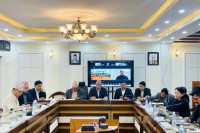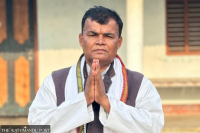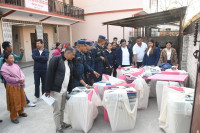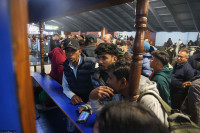National
Nepal conflict victims to move court against law revision
Over 300 victims plan to file a writ petition at the Supreme Court next week against ‘flawed appointments’ and lenient sentencing for serious rights abuses.
Binod Ghimire
Nearly a year after revisions to the Enforced Disappearances Enquiry, Truth and Reconciliation Commission Act, a group of insurgency-era victims are working to lodge a writ petition at the Supreme Court seeking changes to the Act and nullification of the appointments made following the amendments.
They decided to knock on the top court’s door after the government and political parties paid little attention to correcting the appointments of the office bearers in the two transitional justice commissions, which they claim were done without proper consultations. The federal parliament amended the Act in August last year amid reservations from victim groups, human rights activists, and some international human rights organisations.
Nine months after the amendments, the government appointed chairpersons and members to the Truth and Reconciliation Commission (TRC) and the Commission of the Investigation on Enforced Disappeared Persons (CIEDP), which had been vacant for nearly three years. A five-member committee led by Mahesh Thapa, a former joint attorney general, oversees the TRC, while former chief secretary Lila Devi Gadtaula leads the team overseeing the CIEDP.
“Despite having reservations on the amendment, we did not challenge it in the court, believing it could be corrected through practice if competent people were appointed to the commissions,” said Gopal Bahadur Shah, chairperson of the Conflict Victims National Network. “However, the government and political parties bulldozed the selection process, ignoring our concerns. We had no option but to seek the judiciary’s intervention after they ignored our repeated requests to correct the appointments.”
Over 300 people victimised at the hands of state security forces or by the then Maoist guerrilla fighter are lodging the petition earlier next week, according to Shah. The victims’ leaders, backed by human rights activists, had held consultations in seven provinces before coming up with the decision to challenge the Act and the appointments in court.
The victims have reservations about the categorisation of amnestiable and non-amnestiable crimes. The amended Act categorises rape or serious sexual violence, intentional or arbitrary killing, enforced disappearance (provided that the victim’s whereabouts remain unknown), and inhuman torture as serious violations of human rights, hence non-amenstiable.
The categorisation, they claim, is inconsistent with international law and excludes other serious crimes. They argue that the prohibition of torture and the requirement that it be criminalised is absolute and there can be no qualification for “inhuman or cruel” torture, since torture by its nature is inhuman or cruel.
The victims have also found a serious flaw in the provision allowing a 75 percent reduction in the sentencing of those convicted of serious violations who cooperate in the investigation process. The victims and human rights activists say this provision contradicts the principle that criminal sanctions must be proportionate to the gravity of the crime, and undermines the judiciary’s fundamental role and competency.
For the past few months, the victim organisations together with human rights organisations have been voicing concerns against the appointments and the amendment to the Act.
Two weeks ago, they submitted a shadow report to the UN Human Rights Council, the intergovernmental body within the United Nations system responsible for addressing human rights violations. In the report, a coalition of 47 victims and 26 civil society organisations claimed that the legitimacy crisis in Nepal’s transitional justice process continues to deepen even two decades after the start of the peace process.
The Act was amended following the Supreme Court’s intervention. The court had turned down several amnesty provisions in the Act terming them unconstitutional and in violation of Nepal’s international human rights obligations.
If this writ petition is registered, it will be the second petition challenging the Act. Earlier, in January, 44 individuals including advocates Gyanendra Raj Aran and Kul Bahadur Limbu had challenged the Act in court.




 23.27°C Kathmandu
23.27°C Kathmandu















